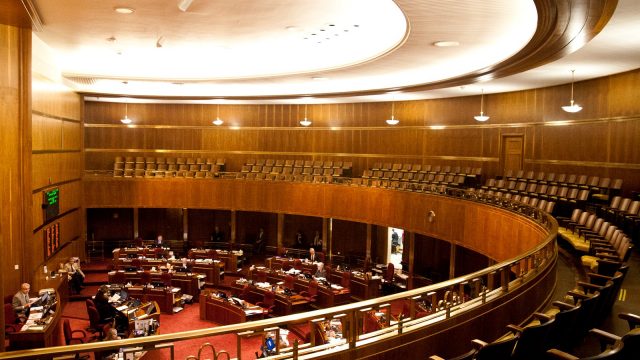North Dakota Has More Money To Spend But Lawmakers Pass Fewer Bills

The North Dakota Legislature meets for no more than eighty days – the maximum the state constitution allows – every odd-numbered year. The most recent session ended in the spring of 2013, and the next session is set to begin next month on January 6th.
Already legislation is being pre-filed for consideration during that session, and soon lawmakers and the public alike will be inundated with news of all the new proposals which could become law. So it’s interesting to look at the trends for legislation over the years.
According to data from Legislative Council (see below), since the 1983 session the state’s lawmakers have passed 10,018 bills (meaning they were approved by both houses of the legislature and signed by the governor). That’s an average of about 626 bills per session (not counting resolutions which, if they amend the constitution, must be approved by voters).
But the trend in both laws introduced and signed into law has actually been downward
Keep in mind, the laws introduced includes those originating in both the House and the Senate. Those counted as becoming law include all bills signed by the Governor.
Here are some other fun facts:
- The House passes about 58.41 percent of laws introduced.
- The Senate passes about 65.04 percent of laws introduced.
- About 60.8 percent of all laws introduced in either house are passed.
- The governors during this time period (Olson, Sinner, Schafer, Hoeven, Dalrymple) signed over 99 percent of all bills that reach his desk.
- The governors vetoed an average of 8 bills per session (including some line-item vetoes).
- The Legislature overrode the governor’s veto only five times during this period, and they haven’t done it since 1999.
It’s worth noting that many Senate bills die in the House, and vice versa. Also, many bills are duplicative and get combined with one version being defeated while another passes. But suffice it to say that the Legislature ends up approving about 60 percent of the bills that get filed in any given session, and that the Governor signs almost all of them with few vetoes which are overridden on vanishingly rare occasions.
Also worth noting that bills passed don’t necessarily represent new laws to follow. A lot of the bills the Legislature passes every biennium are appropriations. Many of them are one-time appropriations (money for a building or a road), and many of them are also routine budget requests from the state’s various agencies.
But I’m honestly surprised that the number of bills has declined, especially in recent years when the amount of money lawmakers have to spend has skyrocketed. Here’s biennium-to-date revenues for the current biennium, compared to the previous three.
I can’t explain bills introduced have declined. You’d think, with more money to spend, the opposite would be true.






